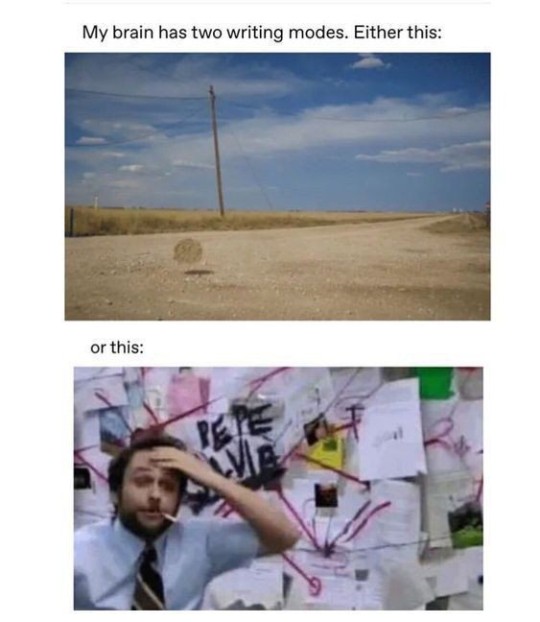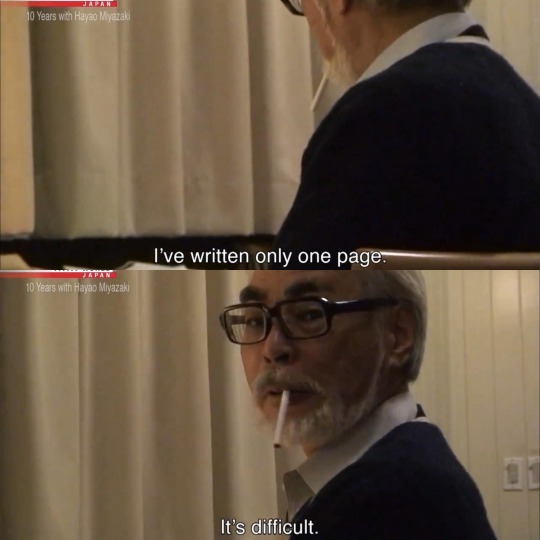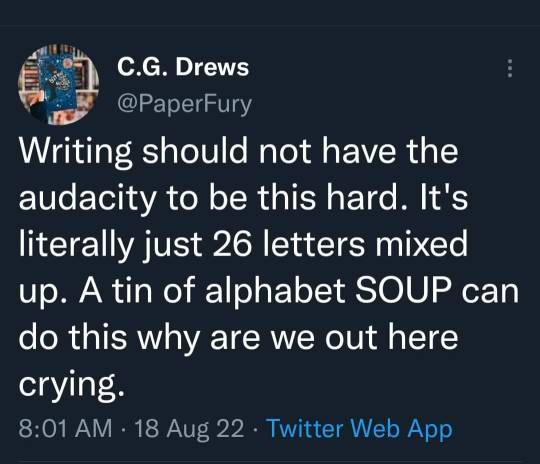Text
classic scifi novels by men r always like. page 1 here’s a cool scifi idea i had. page 2 i hate women so much it’s unreal
106K notes
·
View notes
Text
been trying to edit the novel I finished last year but editing is so overwhelming... I'm not used to making big structural changes. I've read guides, written notes (so many notes) about what I need to fix/change, and tried to break it into baby steps but aghhhh. I was far too optimistic thinking I could get it done in a couple of months. my low drive to continue working on the story after it's "finished" certainly hasn't helped.
#writing problems#writeblr#the plant speaks#I'm used to doing fanfic where i publish as i work and can't go back to edit#then drive myself into a corner and have to jump through hoops trying to pretend it was intentional
1 note
·
View note
Text
2023 Reads
This year I've read 24 books - I had only planned to read one book per month, given that I've barely read since leaving highschool. But my old bookworm self is re-emerging! As I write this, I'm on my 25th lol.
I decided at the start of the year that I wanted to try an read a wide variety of genres, which I did. Didn't love everything I read, but such is life. Below are all the titles and my terrible attempts to summarise the plots. The ones with a heart were my favourites and ones I highly reccommend.
My full list in order:
No Destination by Satish Kumar
Autobiography of the life of a pilgrim who left his family at 9 years old to become a Jain monk, then left that to become an activist and walk across continents.
Not the kind of life story you hear everyday, that's for sure.
How to Invent Everything by Ryan North
(Nonfiction) An in depth guide for the stranded time traveller that needs to recreate modern technology from scratch.
Funny, easy to understand, and bitesized sections that can be read when you've got a spare 5 mins.
Moral Compass by Danielle Steel
A girl who experiences sexual assault while at a private school that newly became co-ed, and the resulting court case/investigation into what happened.
Personally I felt this read like a case-study more than a story, and the message was very heavyhanded.
Meddling Kids by Edgar Cantero ❤
A horror comedy about a group of adults that used to be sleuths in their teens reunite to solve a case that everyone thinks has been wrapped up.
This was recommended to me by a librarian that said it was like "if the scooby doo gang all had trauma and fought eldritch beings" which perfectly summed it up. Also, if you shipped Velma and Daphne... you'll enjoy this book 👀 The writer randomly switches to a script-like format at times, some people hate that but I personally like when an author does whatever the fuck, just because he can. Delicious dark humour.
The Rain Heron by Robbie Arnott ❤
About a woman who lives alone in the mountains in a country devastated by a coup, and is sought out by a soldier in order to find the mythical Rain Heron.
Nice prose and descriptions, and the other character's pov chapters have some great suspense.
The Mark and The Void by Paul Murray
An office worker meets a novellist who wants to write about his life.
I was really into the first half of the story, but the second half became boring as the plot stagnated
Resistance by Samit Basu
People have superpowers corresponding to their innermost desires, and we follow the life of a billionaire who is the leader of a mecha group and the lives of their enemies.
I accidentally picked this up at the library, not realizing it was a sequal to Turbulence, but it read okay on it's own. You'd like this if you're into My Hero Academia or other shounen anime.
Notes from the Burning Age by Claire North ❤
Set in the distant future after an apocalypse, an archivist is forced to translate documents from the "burning age" for the Brotherhood
I still think about this story daily. The writing has an interesting style and rhythm and the plot is packed with intriguing developments
The Library at Mount Char by Scott Hawkins ❤
There's a library with the secrets to the universe, and several people, called Pelapi, grew up learning a unique catalogue of skills using its books, taught by Father, who might be God? But he's gone missing lately.
If you like The Umbrella Academy you'd like this. Like Meddling Kids, it's also dark and funny.
The People we Meet on Vacation by Emily Henry
A journalist and her old friend go on holiday in a last attempt to rekindle their friendship.
I found this book on a train, then left it on another. Hopefully it got a new home! The story was sweet, especially the ending where the journalist spent some time on herself.
It's Kind of a Funny story by Ned Vizzini
A teenage boy suffers a mental breakdown and spends a week in a psychiatric ward.
Given to me by a family member, I am now a bit concerned for her. It has a happy ending, at least. There was a transphobic depiction of a character that was mentioned in the blurb, but she doesn't even stay for the whole story.
The Darkness Knows by Arnaldur Indridason
A body is found on a mountain in Iceland, reopening a cold case from 30 years ago, bringing the detective in charge of it out of retirement.
The prose isn't great in this due to a poor translation. The plot/characters are a bit cliche but not too bad overall. The ending was unexpected yet also expected in the best way?
Legends and Lattes by Travis Baldree ❤
Cosy fantasy about an orc who retires from adventuring to open a coffee shop/cafe.
Bought this after seeing it recommended for people that like Stardew Valley. I liked the amount of detail that went into just building the shop. The prose is simple, but I find that fits the main character, Viv, well, and there were some really good lines/messages in the story. I have adopted Thimble.
Leonard and Hungry Paul by Ronan Hession
Two unremarkable irish men consider their lives and place in the universe.
This would've been one of my favourites had it not focused so much on Paul's sister's wedding. The book should've been called Leonard, Hungry Paul, and Grace. I did enjoy the conversations in this book, and the attention to the mundane.
Summer Sons by Lee Mandelo
Southern Gothic queer supernatural story about a college student trying to solve the case of his best friend's death, while being haunted by Revenants.
This took me ages to read because it was so emotionally heavy and the plot moved slowly. Like it had some incredibly good prose and relationship dynamics, but I couldn't force myself to read it again.
Psalm for the Wild Built by Becky Chambers
Solar punk story about a (nonbinary!) person who suddenly switches jobs to become a tea monk, then leaves that to visit a hermitage and meets a robot along the way.
This is a short book because the sequel is the second half of the story. £13-17.99 seems too expensive for half a book. It was recommended as a cosy fantasy but the MC is existentially unhappy with their life for most of it, so the story doesn't quite fit in that category.
A Cosmology of Monsters by Shaun Hamill ❤
Noah, the youngest child of his family, narrates the life of his parents: a bookish mother and a Lovecraft-horror lover father, and the monsters they all encounter
Phenomenal prose, characters, themes, and plot. Lots of psychological trauma and inner demons.
Those People Next Door by Kia Abdullah ❤
A family moves into a suburb and a war begins between them and the neighbours after he knocks down their "black lives matter" banner.
Oh boy, it sure escalates to become way out of hand. It has a mystery element to it which I enjoyed trying to figure out. Lots of tension between plot points. The last line! Agh!!
The Fall by Louise Jensen
A girl falls off a bridge and the family/police try to uncover who pushed her, but instead uncover secrets about the family.
There were some parts that didn't make sense to me, and there was a lot of characters to keep track of. Not a bad book but it just didn't have that extra spark.
Bookshops and Bonedust by Travis Baldree
Prequel to Legends and Lattes (but can be read on its own) where Viv has recently started adventuring but has to recover from an injury before she can return to her group. She helps out at a bookshop and gets caught up with a necromancer.
Preferred the first book as it felt cosier, but the action in this book is fun too.
Days at the Morisaki Bookshop by Satoshi Yagisawa
A woman leaves her office job after a breakup to live above her uncle's bookshop and helps out, but she hates books.
Too short for my liking, and the main character was difficult to connect to and the relationships/conversations seemed shallow. the second half of the story centres on the uncle's wife and while it had a valuable lesson it just wasn't as good to read.
Tomorrow and Tomorrow and Tomorrow by Gabrielle Zevin
Childhood friends meet again in college and design a game together, which changes their lives/careers.
This was not a terrible book, but it did have some strange descriptions, and the author doesn't understand how the game industry works.
The Hike by Lucy Clarke
4 women who have been friends since highschool go to Norway to climb Mount Blajfell, but they are not prepared for the trek
I felt this had some cliches, but a pretty decent suspense novel
And Then There Were None by Agatha Christie
10 people are invited to Soldier Island for various reasons, only to find they all have one thing in common... murder.
I was theorizing like crazy during this, trying to guess whodunnit. I felt like the reveal was a bit disappointing because how on earth was anyone meant to guess that??
Library books: 9
Given to me: 5
Favourites: 7
If you have any recs for me I'd love to know, just message me!
7 notes
·
View notes
Text
Okay. Okay. Okay. So.
I've been writing since september, didn't want to post anything about it online in case I got overwhelmed and didn't finish. but I did. I DID!! At 73500+ words I have completed draft zero of my novel, Leaving The Woods.
It's about a hermit who decides to rejoin society, and he leaves his fantasy world (where everyone is humanoid animals, there's lore) through a portal to visit Scotland in hopes of having a fresh start. It's not easy, as many people are mean to him as they look down on him for being a hermit, or are simply not good friends to him, and he has severe anxiety, buuut he meets someone similar to him with the same goal and together they grow thanks to the power of friendship!
I'll come up with a more put together synopsis eventually, but that's the gist of it. A reverse-isekai with a healthy wallop of exploring mental health.
I would really love to get this published, and I don't know if posting it online affects the copyright or whatever..? If you have advice about that I'd love to learn. But that's not for a long way down the road, as I'm leaving the story to simmer for a few weeks, and I imagine the editing will take twice as long as it took to write this.
eee so happy that I'm done!
1 note
·
View note
Text
✏️ Sit down, put the words on the page.
✏️ Sit down, put the words on the page.
✏️ They don't have to be good words.
✏️ They don't have to be many words.
✏️ They don't have to be inspired words.
✏️ They don't have to be motivated words.
✏️ Sit down, put the words on the page.
✏️ Writing that exists is better than writing that doesn't exist.
8K notes
·
View notes
Text
4 Alternatives to Popular Writing Advice

Some writing advice get passed off as something every writer has to do. The truth is, these tips might not work for everybody! NaNo participant Nicole Wilbur offers some alternatives to popular writing advice that may be a better fit for your writing needs.
While there are no definitive writing “rules”, there’s certainly writing advice so common it feels like it’s become canon. Most popular writing advice is generally good – but what if it doesn’t light up your brain? What if a particular tip doesn’t resonate with you?
If this popular advice isn’t working - try these alternatives!
Common advice: Make your character want something.
Alternative: Ask what your character is most afraid of.
Your character usually wants something – the MC’s goal driving the story is a common plot, after all. That something needs to be concrete, meaning the audience will know definitively when they’ve achieved their goal.
(Is “found independence” concrete? No. Signed the lease on their first apartment? Yes.)
But if you aren’t sure yet, or what they want doesn’t feel motivating enough to support your inciting incident, start with a different question: what is your character afraid of?
Katniss wants to survive, with her family, yes. But she’s terrified of helplessly watching them die.
Common advice: Identify your story’s theme and stick it on a post- it above your computer.
Alternative: Use the character’s arc to create a main idea statement, and craft several related questions your story explores.
English class really made ‘theme’ feel heavy-handed. In my grade nine English class, we listed the themes of To Kill a Mockingbird as: coming of age, racism, justice, and good vs. evil.
While these are the topics explored in the book, I’ve never found this advice helpful in writing. Instead, I like to use the controlling idea concept (as in Robert McKee’s Story) and exploratory questions (as in John Truby’s Anatomy of Genres).
A controlling idea is a statement about what the author views as the “proper” way to live, and it’s often cause-and-effect. The exploratory question is – well, a question you want to explore.
In It’s a Wonderful Life, the controlling idea is something to the effect of “Life is meaningful because of our relationships” or “our lives feel meaningful when we value our family and community over money.” The question: How can a single person influence the future of an entire community?
Common advice: List out your character’s traits, perhaps with a character profile.
Alternative: Focus on 2-3 broad brushstrokes that define the character.
When I first started writing, I would list out everything I wanted my character to be: smart, daring, sneaky, kind, greedy, etc. I created a long list of traits. Then I started writing the book. When I went back to look at the traits, I realized the character wasn’t really exhibiting any of these.
Instead of a long list of traits to describe your character, try identifying three. Think of these like three brush strokes on a page, giving the scaffolding of your character. Ideally, the combination of traits should be unexpected: maybe the character is rule-following, people-pleasing, and ambitious. Maybe the character is brash, strategic, and dutiful.
Then – and this is the fun part – consider how the traits come into conflict, and what their limits are. What happens when our ambitious rule-follower must break the law to get what she wants? Sure, a character might be kind, but what will make her bite someone’s head off?
Common advice: Create a killer plot twist.
Alternative: Create an information plot.
Readers love an unexpected plot twist: whether a main character is killed or an ally turns out to be the bad guy, they’re thrilling. But plotting towards one singular twist can be difficult.
Instead of using the term plot twist, I like thinking in terms of Brandon Sanderson’s “information” plot archetype.
An information plot is basically a question the reader is actively trying to work out. It could be like Sarah Dessen's Just Listen where we wonder "what happened between Annabel and her ex-best friend?", "why is Annabel's sister acting strangely?" and "who is Owen, really?" Those all have to do with backstory, but information plots can be about pretty much any hidden information. Another popular question is "who is the bad guy?" - or in other words, "who is after the characters?" The Charlie's Angel franchise, for example, tends to keep viewers guessing at who the true antagonist is until the last few scenes.
Nicole Wilbur is an aspiring YA author, writing sapphic action-adventure stories that cure wanderlust. As a digital nomad, she has no house and no car, but has racked up a ridiculous number of frequent flier miles. She chronicles her writing and travelling journey on her YouTube channel and Chasing Chapters substack.
Photo by George Milton
415 notes
·
View notes
Text


Me opening up the word doc and getting stuck in the exact same place as last time
5K notes
·
View notes
Text

21K notes
·
View notes
Text

Me writing
24K notes
·
View notes
Text
show, don't tell:
anticipation
- bouncing legs
- darting eyes
- breathing deeply
- useless / mindless tasks
- eyes on the clock
- checking and re-checking
frustration
- grumbling
- heavy footsteps
- hot flush
- narrowed eyes
- pointing fingers
- pacing / stomping
sadness
- eyes filling up with tears
- blinking quickly
- hiccuped breaths
- face turned away
- red / burning cheeks
- short sentences with gulps
happiness
- smiling / cheeks hurting
- animated
- chest hurts from laughing
- rapid movements
- eye contact
- quick speaking
boredom
- complaining
- sighing
- grumbling
- pacing
- leg bouncing
- picking at nails
fear
- quick heartbeat
- shaking / clammy hands
- pinching self
- tuck away
- closing eyes
- clenched hands
disappointment
- no eye contact
- hard swallow
- clenched hands
- tears, occasionally
- mhm-hmm
tiredness
- spacing out
- eyes closing
- nodding head absently
- long sighs
- no eye contact
- grim smile
confidence
- prolonged eye contact
- appreciates instead of apologizing
- active listening
- shoulders back
- micro reactions
90K notes
·
View notes
Text
Writer's block comes to us all at some point, but it doesn't have to keep you from achieving your goals. Here are some techniques for overcoming writer's block to keep you on track for your word count goals this NaNoWriMo!
26 notes
·
View notes
Note
Not sure if you've answered something like this before, but how do I write "prettier" sentences? I know one thing that will help would be expanding my vocabulary, but a thesaurus only seems to get me so far. I feel like when I write, especially when I'm describing things, my sentences are so basic. Idk if this makes sense, if it doesn't I can try and find examples from other writers to help describe what I'm talking about!
How to Write "Prettier" Sentences
Pretty prose is something many writers aspire to, however, it's not as easy to achieve as looking up words in a thesaurus. It's something you have to train yourself to do through both learning and practice.
Learn By Reading/Listening
First and foremost, making sure you're reading/listening to a variety of books and stories is essential if you want to learn how to craft prettier prose. Reading and listening to stories helps train your brain to: recognize the cadence of pretty prose, understand the structuring of pretty prose, understand how to craft meaningful imagery, and fills your head with vocabulary.
Expanding Your Vocabulary
Vocabulary is also an important component of crafting pretty prose. Following web sites, pages, and apps that have a "word of the day" (like the Merriam-Webster website) is a great way to learn new words. You can also purchase a word-of-the-day desk calendar for 2024. Some writers like to flip open the thesaurus every day on a random page and read a few random words. You can also read creative articles in newspapers, magazines, websites, etc. to learn new words. You can also look up the specific vocabulary for something you're describing, like if you're describing a house, you can look up the architectural style and general architectural terms to learn how to describe specific things like the style of home, the trim, the windows, etc. Finally, in addition to the thesaurus as a source of new words, you can add other word references to your collection, such as The Describer's Dictionary, the Random House Word Menu, The Writer's Lexicon, etc.
Learning Poetic Cadence and Imagery
Listening to music/reading song lyrics, and reading/listening to poetry are great ways to teach your brain how to craft descriptive imagery. Poetry has to say a lot with few words, so it helps you understand the power of using just the right words in just the right way.
Effective Description is Important
Effective description is of course another piece of the puzzle. Not all writing is description, but a lot of pretty prose is descriptive. So, when you're describing things in your story, make sure to consider the senses--what can be seen, heard, tasted, smelled, felt/touched? You don't want to incorporate all of that into the description of one thing, obviously, but if your character is walking into a forest, considering all of those things can help you come up with a vivid, beautiful description. Sometimes, looking for photos or videos of the thing you want to describe can be helpful, too.
Practice Makes Perfect
And last but not least: practice. Once you've started to train your brain using the methods above, when you go through a draft to revise it and come to a sentence that needs sprucing up, try out different things that you've learned. Don't go overboard with the thesaurus, but perhaps your sentence describes twinkling stars... is there another word you could use instead of twinkling that's more surprising and vivid? The thesaurus suggests: glimmering, shimmering, sparkling, blinking... cross-checking each of these in the dictionary shows they're all appropriate choices for describing the twinkle of a star. You can also read the sentence out loud to listen to the cadence... are there longer or shorter (yet appropriate) words you can use instead to make the sentence more lyrical? Improving your sentences in editing helps you learn to craft pretty sentences as you're writing them the first time.
I hope that helps!
•••••••••••••••••••••••••••••••••
I’ve been writing seriously for over 30 years and love to share what I’ve learned. Have a writing question? My inbox is always open!
LEARN MORE about WQA
SEE MY ask policies
VISIT MY Master List of Top Posts
COFFEE & FEEDBACK COMMISSIONS ko-fi.com/wqa
465 notes
·
View notes
Text
yeah but you’re telling me i have to create scenes out of nothing??
you’re telling me a brain stormed this page???
291 notes
·
View notes
Text

46K notes
·
View notes
Text
Some of my writer’s block cures:
Handwrite. (If you already are, write in a different coloured pen.)
Write outside or at a different location.
Read.
Look up some writing prompts.
Take a break. Do something different. Comeback to it later.
Write something else. (A different WIP, a poem, a quick short story, etc.)
Find inspiring writing music playlists on YouTube. (Themed music, POV playlists, ambient music, etc.)
Do some character or story prompts/questions to get a better idea of who or what you’re writing.
Word sprints. Set a timer and write as much as you can. Not a lot of time to overthink things.
Set your own goals and deadlines.
Write another scene from your WIP. (You don’t have to write in order.) Write a scene you want to write, or the ending. (You can change it or scrap it if it doesn’t fit into your story later.)
Write a scene for your WIP that you will never post/add to your story. A prologue, a different P.O.V., how your characters would react in a situation that’s not in your story, a flashback, etc.
Write down a bunch of ideas. Things that could happen, thing that will never happen, good things, bad things.
Change the weather (in the story of course.)
Feel free to add your own.
13K notes
·
View notes
Text
Did I daydream this, or was there a website for writers with like. A ridiculous quantity of descriptive aid. Like I remember clicking on " inside a cinema " or something like that. Then, BAM. Here's a list of smell and sounds. I can't remember it for the life of me, but if someone else can, help a bitch out <3
106K notes
·
View notes
